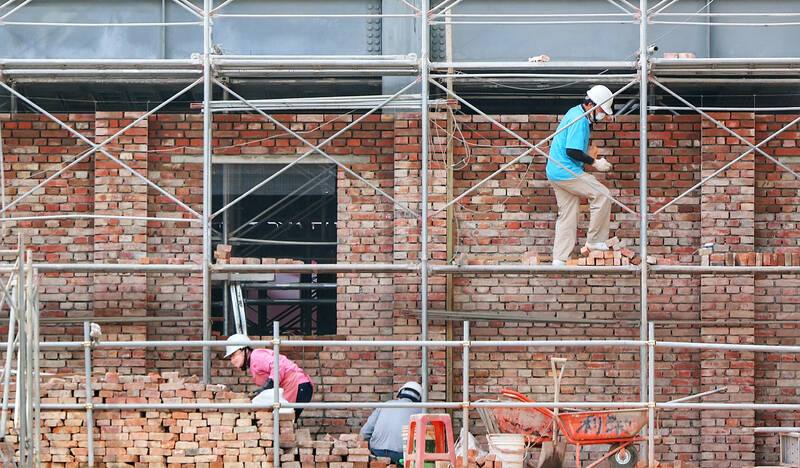Property transactions in the six special municipalities last month totaled 21,368 units, spiking 33.7 percent from one month earlier, driven by people with real demand and new housing completions, brokers said yesterday.
The rebound approached 30 percent in Taipei to 2,553 deals, and climbed even faster in New Taipei City, Taoyuan, Taichung and Kaohsiung, data from respective local governments showed.
Taiwan Realty Co (台灣房屋) research head Charlene Chang (張旭嵐) attributed the pickup to five more working days last month compared with April, as well as new housing deliveries.

Photo: CNA
“People with real demand took action after expectations that housing prices would decline failed to realize,” Chang said.
The absence of new unfavorable policy measures spurred buyers to quit waiting and join the market, the analyst said.
New Taipei City posted the biggest month-on-month gain of 43.9 percent to 5,562 deals, followed by a 40.3 percent increase to 3,724 units in Taoyuan.
Transactions in Taichung registered a 32.4 percent jump to 4,052 units and advanced 34 percent to 3,525 deals in Kaohsiung. Tainan was relatively calm with 8.7 percent growth to 1,952 deals.
The unease linked to the bans on transfers of presale house purchase contracts subsided last month, Evertrust Rehouse Co (永慶房屋) said.
Furthermore, new housing delivery accounted for transaction advances in New Taipei City’s Sinjhuang (新莊), Sanchong (三重) and Sijhih (汐止) districts, as well as Taoyuan’s Longtan (龍潭) and Jhongli (中壢) districts, Evertrust Rehouse deputy research manager Chen Chin-ping (陳金萍) said.
However, it would be too early to paint the rebound as a sustained recovery as the transaction volume shrank 6.4 percent compared with a year earlier, Chen said.
Cumulative deals in the first five months of the year tumbled 21.4 percent year-on-year to 86,640 units for the six special municipalities, Chen added.
Great Home Realty Co (大家房屋) head researcher Mandy Lang (郎美囡) was also cautious, saying buyers and sellers remained at loggerheads over housing prices, which could slow transactions.
Additionally, the rebound would come to a halt if the central bank raises interest rates again later this month, H&B Realty Co (住商不動產) said.
The central bank is to review its monetary policy on June 15.

GROWING OWINGS: While Luxembourg and China swapped the top three spots, the US continued to be the largest exposure for Taiwan for the 41st consecutive quarter The US remained the largest debtor nation to Taiwan’s banking sector for the 41st consecutive quarter at the end of September, after local banks’ exposure to the US market rose more than 2 percent from three months earlier, the central bank said. Exposure to the US increased to US$198.896 billion, up US$4.026 billion, or 2.07 percent, from US$194.87 billion in the previous quarter, data released by the central bank showed on Friday. Of the increase, about US$1.4 billion came from banks’ investments in securitized products and interbank loans in the US, while another US$2.6 billion stemmed from trust assets, including mutual funds,

AI TALENT: No financial details were released about the deal, in which top Groq executives, including its CEO, would join Nvidia to help advance the technology Nvidia Corp has agreed to a licensing deal with artificial intelligence (AI) start-up Groq, furthering its investments in companies connected to the AI boom and gaining the right to add a new type of technology to its products. The world’s largest publicly traded company has paid for the right to use Groq’s technology and is to integrate its chip design into future products. Some of the start-up’s executives are leaving to join Nvidia to help with that effort, the companies said. Groq would continue as an independent company with a new chief executive, it said on Wednesday in a post on its Web

JOINT EFFORTS: MediaTek would partner with Denso to develop custom chips to support the car-part specialist company’s driver-assist systems in an expanding market MediaTek Inc (聯發科), the world’s largest mobile phone chip designer, yesterday said it is working closely with Japan’s Denso Corp to build a custom automotive system-on-chip (SoC) solution tailored for advanced driver-assistance systems and cockpit systems, adding another customer to its new application-specific IC (ASIC) business. This effort merges Denso’s automotive-grade safety expertise and deep vehicle integration with MediaTek’s technologies cultivated through the development of Media- Tek’s Dimensity AX, leveraging efficient, high-performance SoCs and artificial intelligence (AI) capabilities to offer a scalable, production-ready platform for next-generation driver assistance, the company said in a statement yesterday. “Through this collaboration, we are bringing two

Even as the US is embarked on a bitter rivalry with China over the deployment of artificial intelligence (AI), Chinese technology is quietly making inroads into the US market. Despite considerable geopolitical tensions, Chinese open-source AI models are winning over a growing number of programmers and companies in the US. These are different from the closed generative AI models that have become household names — ChatGPT-maker OpenAI or Google’s Gemini — whose inner workings are fiercely protected. In contrast, “open” models offered by many Chinese rivals, from Alibaba (阿里巴巴) to DeepSeek (深度求索), allow programmers to customize parts of the software to suit their